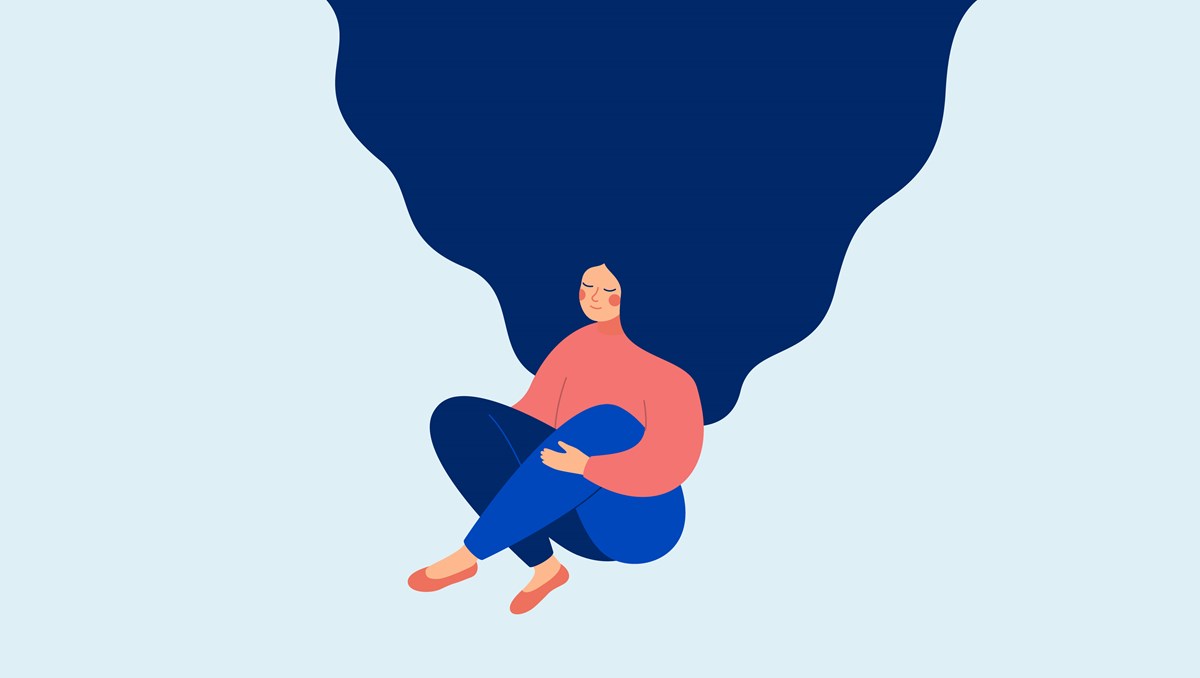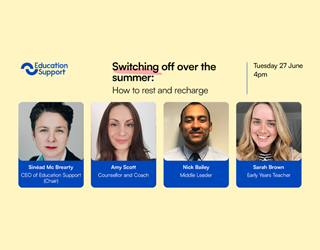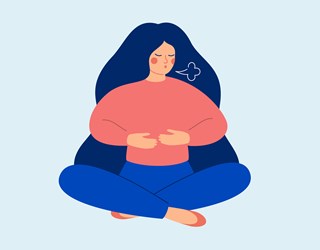Managing anxiety part 1: get your body and mind working together
This week is Mental Health Awareness Week and the theme is anxiety. Gemma Scotcher, our Director of Communications and Public Affairs, spends a lot of time visiting schools and colleges, talking about the effects of stress and anxiety on our bodies and brains. She also has ADHD and Cyclothymia.
Find out what she’s learnt and how it has helped her manage her own anxiety.
Articles / 5 mins read

I feel a bit anxious writing this! Why? Anxiety is a natural part of being human. A helpful amount of it can press us to double check an important piece of work, or ensure we’ve prepared properly for an interview, or observation.
But if it’s too strong, for too long, it can leave us drained, frazzled, scattered, unable to sleep or even… my favourite… taking to the odd ‘avoidance nap’. It can also leave us with elevated levels of stress hormones that can affect our physical health in the long term.
So what would I like teachers and educators to know about anxiety?
It’s in our head body!
Anxiety is associated with high levels of cortisol and adrenaline in our bodies. Cortisol is your body’s main ‘alarm system’ for when something is registered as a threat. It tells the rest of your body that it’s time to respond to danger. One of adrenaline’s main roles is to push blood to your muscles and get your body moving in response to the threat. So if your system is flooded with both chemicals, it’s all systems go – time to run. How uncomfortable if you’re confined to a classroom or office!
If an observer enters your class or office, your cortisol and adrenaline levels may spike. You’re cool as a cucumber on the outside, but physiology doesn’t lie. You get sweaty hands, your heart races. When the observer leaves, ideally your stress levels would go back down. But for many of us, life isn’t that simple.
Perhaps your mind starts running through all the things you think you said or did wrong? Maybe you start imagining a catastrophic outcome from the observation? These thoughts keep the body’s stress response activated. More adrenaline, more cortisol. Your stress hormones remain elevated.
This is anxiety. Your thoughts are keeping your body in a state of threat, long after the source of danger has left.
Your mind and thoughts have an important role in this, I don’t intend to downplay that. Cognitive approaches to managing anxiety can be incredibly helpful.
But a shift happened for me, when I started to understand the biological or physical reactions happening in my body when anxiety took hold. It gave me a new lens through which to view my anxiety and it helped me to realise that there were steps I could take to feel different.
As I felt the rising panic, I could tell myself “Ok, you’re stress hormones are taking over. You’re not actually unsafe.”
Learning about my body had a massive impact on my self-talk and my cognitive understanding of whether I was safe or not.
What about the good stuff?
As well as stress hormones, we have feel good hormones and messengers in our brains and bodies. Finding this out was a revelation for me when it came to managing my anxiety. You may have heard of DOSE:
Dopamine – often referred to as the ‘reward’ chemical and it has a big role to play in motivation and focus, but also pleasure and whether we feel energised or not. Music, exercise, cold water and good food are potential sources of Dopamine.
Oxytocin – often called the love hormone. It helps mothers to bond with infants, but is present in our bodies as adults and can be accessed through times with friends and loved ones. It helps us to feel connected to, and safe around, other people. I often think of it as having a role to play in that ‘cozy’ feeling we can get around people we really care about.
Serotonin – this carries a range of messages throughout the nervous system and can affect mood, sleep, digestion, memory, sex drive, body temperature regulation and even has a role to play in migraines. Sunshine is a great source of serotonin, as well as meditation and breathing exercises, and some food sources are thought to be too.
Endorphins – your body’s natural pain killers. Endorphins help you to keep going when things are tough. They’re the reason for the famous ‘runners’ high’ but you can also access them through things like acupuncture and massage.
There’s a lot of information about how to access these feel-good hormones and brain messengers. Exercise, food, cold water therapy, laughter, time with friends, creative pursuits. If you’re curious, you can research ideas quite quickly online.
I also think it’s important to emphasise that when you do research ways to access DOSE the important thing is to find what works for you. You might be more of a visit the petting zoo, play Dungeons & Dragons or speed read the entire Chekov back catalogue type person. Whatever works.
These feel-good chemicals are a part of our biology and can be accessed by us when we need to. This is how we tell our bodies that we are safe, comfy, relaxed, connected or feeling free.
I’d never claim that accessing our body’s feel-good chemicals is a cure all – certainly not in the case of of severe trauma or psychiatric diagnosis – but this knowledge has been a really helpful tool for managing my anxiety and overall wellbeing.
What I found helpful, when I started to understand the presence of feel-good hormones, was twofold:
- I decided to prioritise activities that told my body to release the good stuff. I’m a massive cold water swimming addict since understanding all this stuff, and this has become a core part of managing my mental health diagnoses. But I have also found quick and easy tactics that can be built into the working day. You can read more about that in part two of this blog.
- This knowledge has also powerfully changed my internal narrative – the stories I was telling myself about how I was feeling.
“Oh jeez, this is awful, you’re awful and you’ll never feel good again” became “oh yeah, this is stressful, my body is definitely pumping out some danger signals. This can and will end.”
And
“Urgh exercising is the worst, why am I even doing this?” slowly became “Ok exercise, you’re not my fave, but hit me up with some of that sweet, sweet Dopamine and Serotonin. Please and thank you.”
This is body and mind working together to reassure me physically and mentally that I am safe and well.
Game changer.
Recommended reading
- Burnout: the secret to solving your stress cycle by Emily and Amelia Nagoski
- The Body Keeps the Score by Bessel van der Kolk
- Poly Vagal Theory: Neurophysiological Foundations of Emotions, Attachment, Communication, and Self-regulation by Stephen Porges PhD
Do bear in mind that I’m not a mental health professional, so nothing here should take the place of medical advice. This is just my reflections on my own reading and experiences, but I hope it’s useful for some of you working in education who might be reflecting on your own anxiety. Read my next blog on Poly Vagal breathing techniques.
Don’t wait for a crisis to call.
We’ll offer you immediate, emotional support.
08000 562 561

Sign up to our newsletter for the latest mental heath and wellbeing resources, news and events straight to your inbox.





















